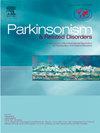对帕金森病药物基因组学现状的批判性评估--还缺什么?系统回顾。
IF 3.1
3区 医学
Q2 CLINICAL NEUROLOGY
引用次数: 0
摘要
导言:帕金森病(Parkinson's disease,PD)的一线治疗包括多巴胺替代疗法;然而,患者的反应存在很大差异。药物基因组学已被视为了解和预测治疗结果的一种潜在方法。本综述旨在评估有关药物基因组学在帕金森病中作用的知识现状,重点是确定挑战并提出未来方向:我们按照 PRISMA 2020 指南进行了系统性综述。我们使用 R 软件包'RISmed'在 PubMed 数据库中搜索了原创的英文研究。我们根据样本大小、人群来源、评估基因和多态性、结果和方法对数据进行了提取和分析:在183篇已确定的文章中,有76篇符合纳入标准。COMT-rs4680多态性是最常被研究的基因,左旋多巴相关运动并发症是最常被评估的结果。除两项研究外,其他所有研究都采用了候选基因方法。在 75% 的研究中,样本量少于 225 人。拉丁裔参与者的代表性明显不足,除巴西外,缺乏来自拉丁美洲国家的研究。所有研究的结果都不一致:患者对帕金森病治疗反应的差异性表明存在遗传倾向。虽然目前的研究增进了我们对帕金森病药物代谢的了解,但尚未完全阐明帕金森病药物基因组学所涉及的复杂遗传相互作用。要在帕金森病临床实践中推动药物基因组学的发展,必须采用新方法、建立规模更大、基因更多样化的队列并改进数据收集工作。本文章由计算机程序翻译,如有差异,请以英文原文为准。
Critical evaluation of the current landscape of pharmacogenomics in Parkinson's disease - What is missing? A systematic review
Introduction
The first-line treatment for Parkinson's disease (PD) involves dopamine-replacement therapies; however, significant variability exists in patient responses. Pharmacogenomics has been explored as a potential approach to understanding and predicting treatment outcomes. This review aims to evaluate the current state of knowledge regarding the role of pharmacogenomics in PD, focusing on identifying challenges and proposing future directions.
Methods
We conducted a systematic review following PRISMA 2020 guidelines. The PubMed database was searched for original, English-language studies using the R package ‘RISmed.’ Data were extracted and analyzed based on sample size, population origin, evaluated genes and polymorphisms, outcomes, and methodological approaches.
Results
Out of 183 identified articles, 76 met the inclusion criteria. The COMT-rs4680 polymorphism was the most frequently studied, and levodopa-related motor complications were the most commonly assessed outcomes. All but two studies employed a candidate gene approach. In 75 % of the studies, the sample size was fewer than 225 individuals. There was a notable underrepresentation of Latino participants, with a lack of studies from Latin American countries other than Brazil. None of the studies produced consistent results across investigations.
Conclusions
The variability in patient responses to PD treatments suggests a genetic predisposition. While current research has enhanced our understanding of PD medication metabolism, it has not yet fully elucidated the complex genetic interactions involved in PD pharmacogenomics. Novel approaches, larger and more genetically diverse cohorts, and improved data collection are essential for advancing pharmacogenomics in PD clinical practice.
求助全文
通过发布文献求助,成功后即可免费获取论文全文。
去求助
来源期刊

Parkinsonism & related disorders
医学-临床神经学
CiteScore
6.20
自引率
4.90%
发文量
292
审稿时长
39 days
期刊介绍:
Parkinsonism & Related Disorders publishes the results of basic and clinical research contributing to the understanding, diagnosis and treatment of all neurodegenerative syndromes in which Parkinsonism, Essential Tremor or related movement disorders may be a feature. Regular features will include: Review Articles, Point of View articles, Full-length Articles, Short Communications, Case Reports and Letter to the Editor.
 求助内容:
求助内容: 应助结果提醒方式:
应助结果提醒方式:


